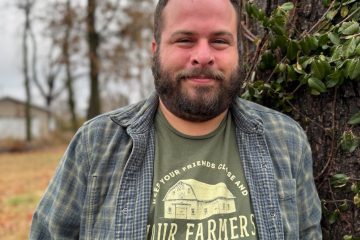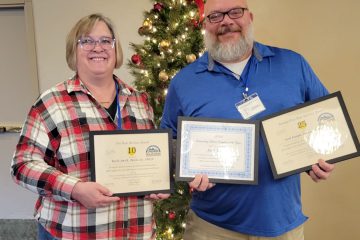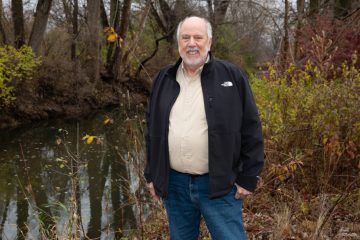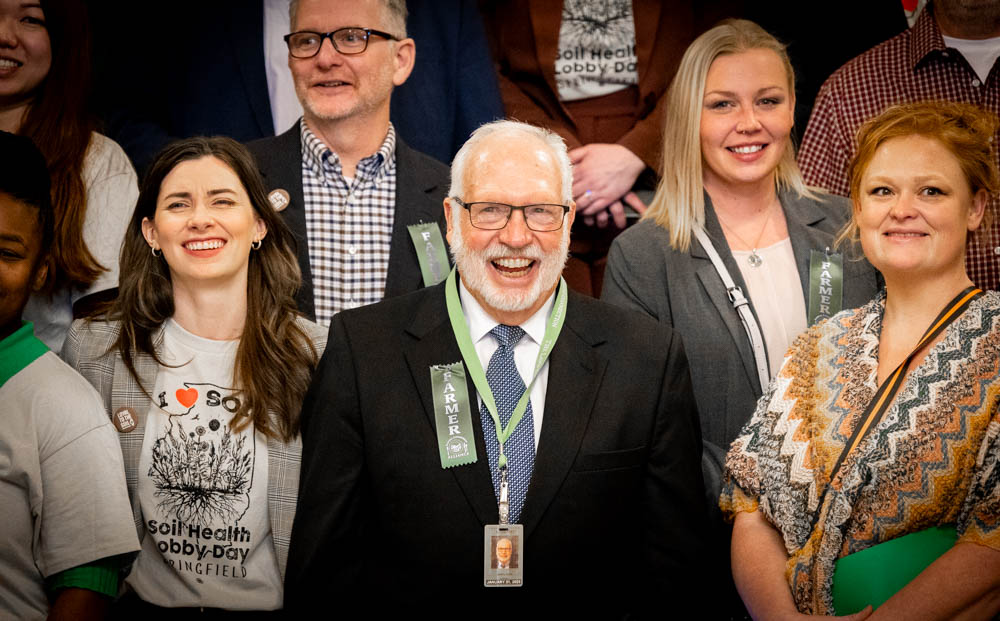
Dick Lyons (center), farmer from Montgomery County and one of the originators of Soil Health Week, surrounded by others during a all-hands group photo at the end of Soil Health Week Lobby Day Wednesday March 6, 2024.
Dick Lyons, former Lincoln Land Community College and Illinois State University agriculture professor, was one of four founders of Illinois Soil Health Week. He was also the top corn and wheat producer (and fourth highest in soybeans) in Montgomery County during a census in 2018. Dick credits using no-till, cover crops, and other conservation practices for helping to release nutrients in his soil while keeping water runoff clean. Read more of his story on AIMillinois.org.
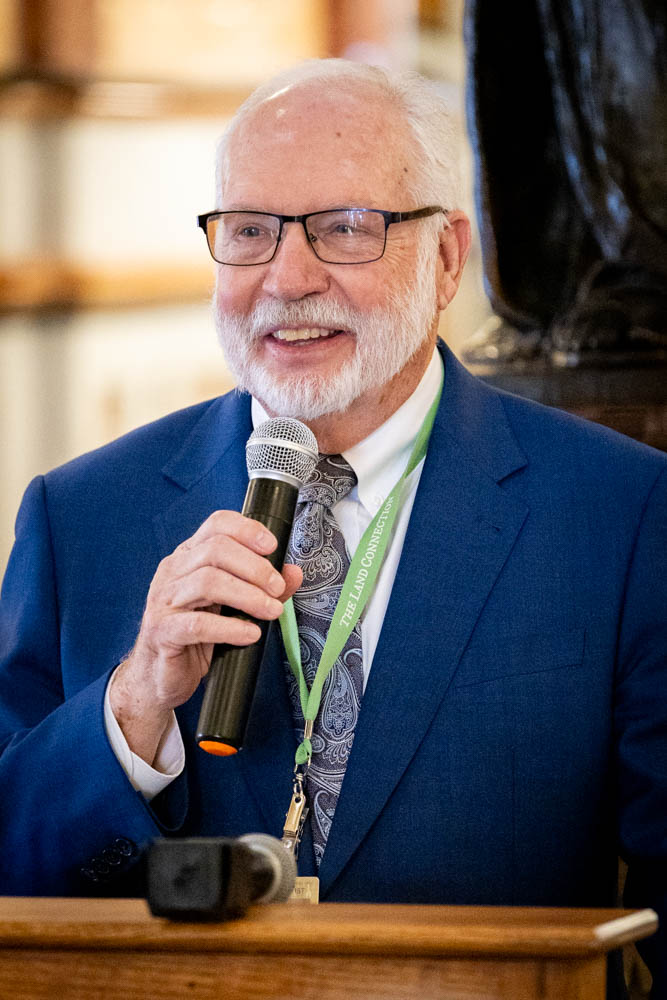
Dick Lyons, farmer from Montgomery County and one of the originators of Soil Health Week, speaks during Soil Health Week – The Art and Science of Soil Health Advocacy in Action Day.
Dick Lyons’ presentation on Soil Health Week’s The Art and Science of Soil Health Advocacy in Action Day Thursday March 7, 2024: It’s always nice to be around the people that you know, and I’ve been fortunate this week to meet all these young people in the polo shirts, the light blue on the AIM Initiative that (Dr. Michael Woods) started. But it’s been a really pleasure.
I want to start off with what I call one of the most influential quotes that means something to our country.
“The history of every great nation is written in the way it treats and cares for its soil.” Franklin D. Roosevelt, 1937. Right at the end of the Dust Bowl or in the heart of it.
Since the beginning of time, man has really relied upon the soils and the community to provide food and fiber for their well-being. In other words, it’s come to the forefront of all of our thinking because soil is the beginning of everything. Famine due to drought, or possibly flooding, dust from windstorms like the Dust Bowl, or what happened here south of Springfield last year. The nutrient loss, something that we hear about all the time every year, if not every two years in our biannual report, are just examples of the crises that occur, that only through crises the soil brought to the forefront in our thinking. And that’s unfortunate.
As a conservation farmer for Montgomery County, Advocacy Day is very important to me because soil health is what we revolve around our farm, a 4th generation farm of an Irish immigrant. I’m really morally moved to spread the word, to take my time and to speak to everyone about the importance of soil health. It’s a part of my soul. It’s a part of my heart. That we, as farmers, as eaters, as they use the term … at Illinois Stewardship Alliance. It’s important that we do have this moral obligation to soil health.
So why should we advocate? Well, the most glaring example is the fact that tillage which destroys soil health also destroys soil aggregation, which is the foundation of soil health.
That tillage, that lack of soil aggregation, led to the loss of eight lives on I-55 just a few miles south of Springfield.
I was in the field that day, I watched the dust start up about nine o’clock. I was side-dressing 28% on my corn. And as I looked out over the sky, you could see it begin to billow.
And a part of my life is my wife, for all of you that know me. I think it’s 57 years next month.
So I remember that date for sure. It was April Fool’s Day which she chose an appropriate date … for me and Sharon to be married. But we fooled and we stuck together.
But in reality, I watched this billow up, and I called her and I said it’s starting to blow … at about 10:30, the black smoke rolled, and the loss of life began.
Another reason – our second important reason for advocating for soil health is the result of soil health – what it does to reduce the amount of erosion we have. If you look at the erosion we’re having across our nation, we’ve got to have the cover crops to hold that soil into place. We’ve got to prevent that valuable richness that we have from going downstream into the Gulf of Mexico.
Charlie, yesterday, talked about the only way we could produce soil, new farmland, is you can go farm the delta in the Mississippi River. Now, that’d be a heck of a way to farm. But in reality, it’s the use of cover crops that makes a difference. They are a foundation that prevents this soil from getting away. But the one I want you to all think about is the erosion that’s occurring in your drinking water lake, whether in Springfield or Lake Lou Yaeger in Litchfield, which is in my county, or Glenn Shoals Lake in my county, we need for our farmers to use cover crops to reduce erosion.
Our fourth method of improving soil health practices that we have is to reduce the greenhouse gasses. This is something I never thought about completely. But to reduce these greenhouse gasses. And I think it’s important because I want to give you another quote here that a man who never thought about greenhouse gasses. “Soil erosion is as old as agriculture. It began when the first heavy rain struck the first furrow turned by prehistoric man with a moldboard plow that he had created. It has been that going on ever since. Whereverman’s culture of the earth has bared the soil to rain and wind, erosion occurs.”
If we were in a classroom today, I would ask you that quote was because made by one of the most important men for this conservation movement. That’s Hugh Hammond Bennet, the first director of the Soil Conservation Service, which is now the Natural Resources Conservation Service. So, important people have noticed that.
Our fourth point why we need to advocate for soil health is it increases the microbial population. I never knew there was anything in the soil when I was going to college. And by the way – where’s Steve at? You are definitely not the oldest of the group here, Steve. … I’ve only farmed for 52 years. That’s all I’ve farmed. So I know it may not be the oldest, but … I’m out there.
But what I want to talk about the last part is these nutrients from the microbial activity.
The microbes are so important to us. We never studied that when I was in college. Now, I’m sure all the colleges are studying the microbial activity in the soil. And what the best thing it does for me? It recycles my nutrients that are already present in the soil, from all the years we raised livestock. That recycling of those nutrients keeps it on the land and not going down the river.
But in closing, I really would like to say that it’s been a pleasure to be a part of this for three years. Liz Rupel, we’re gonna continue no matter what. And it’s going, they’re gonna have this an annual event. I’d like to close with a quote from Aldo Leopold from the Sand County Almanac. Again in 1949, so we’re not on to something new here.
“We abuse land because we regard it as a commodity belonging to us. I’m sure when we see land as a community in which we belong, we may begin to use it with love and respect.” Your neighbors want more land. Do they love the land? I’m not sure, I do.
We’re gonna preserve our farm. Thank you.
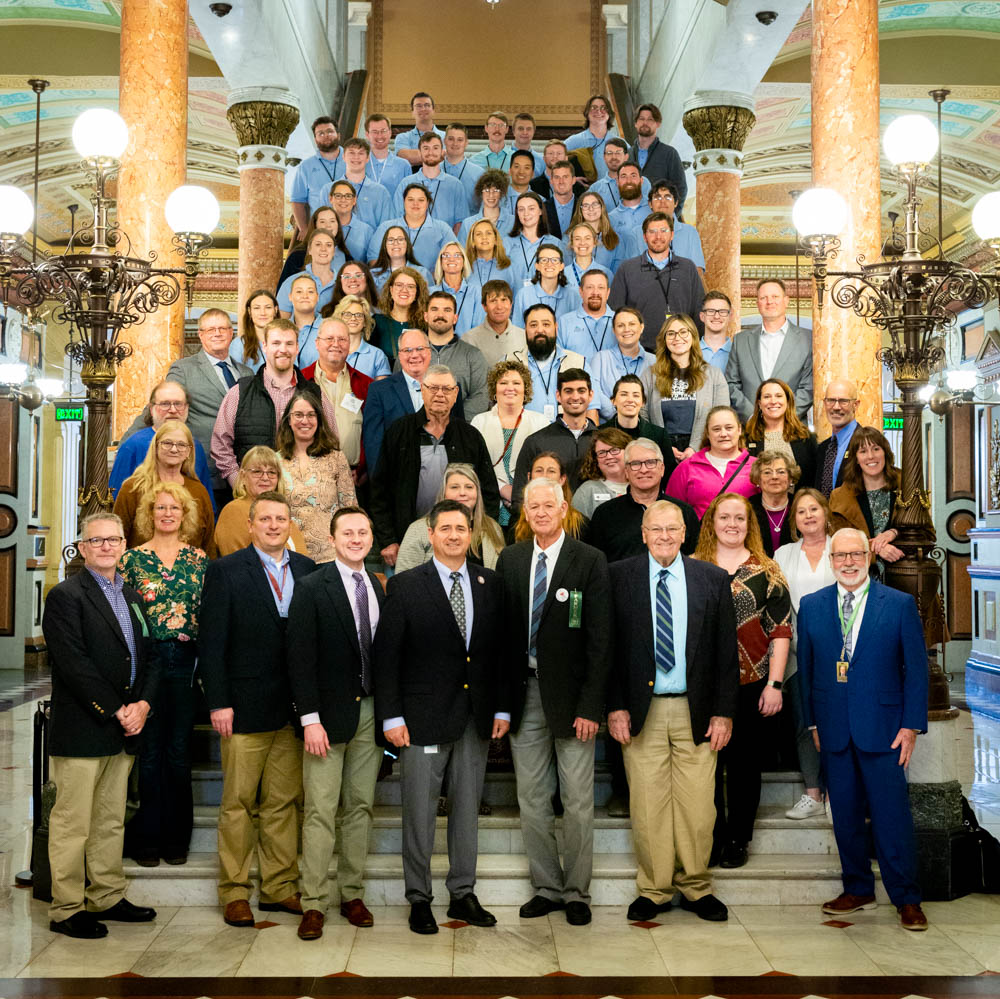
Dick Lyons (right) stands with Illinois Department of Agriculture Director Jerry Costello II, local Soil & Water Conservation District employees and board members, Conservation Planners for the Capacity Building Initiative, Dr. Michael Woods of AISWCD, and other supporters of Soil Health Week in group photo following The Art and Science of Soil Health Advocacy in Action Day.
